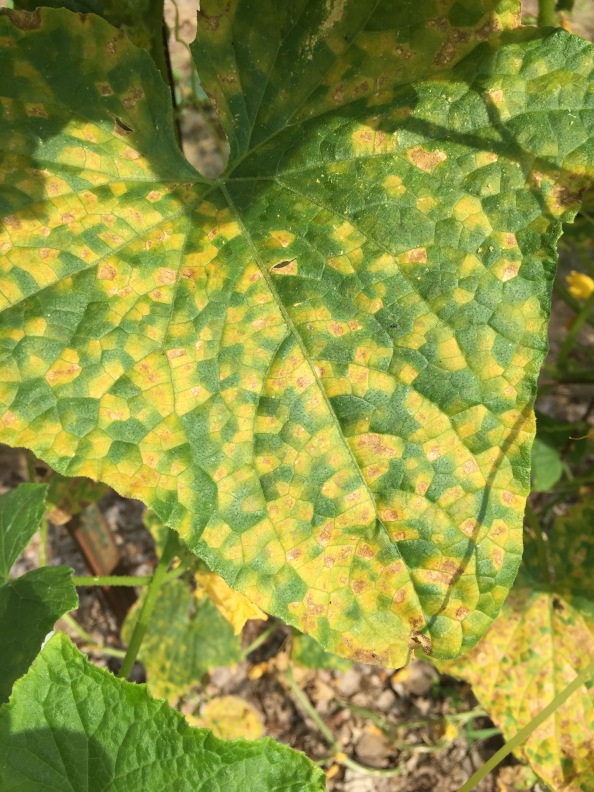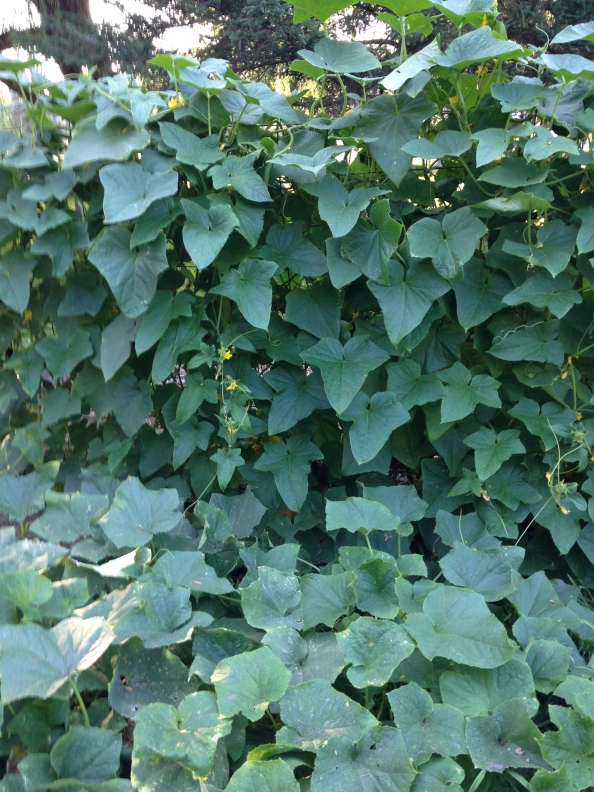Right or wrong, it’s not always easy for gardeners to talk about the things that aren’t growing well. But sometimes those very things teach the most indelible lessons.
From the beginning my cucumber plants have had a rough go this year. The rains came and stayed for a month. Now the plants are positively sickly.
Since there are so many similar diseases that can kill cucumber plants, I decided to submit a question and some images to Ask an Expert, a service run by the Extension Agency.
A prompt and thorough answer came the next day; Downy Mildew. Arg.
“There are few management practices that can be used to control downy mildew in the home garden.”
“The early appearance of downy mildew in Michigan, along with the wet and humid weather, may make cucumber growing especially challenging this year.”
Uh, yeah.
Well, suck it up and learn, mister.
The first change I’ll make in next year’s cucumber plantings are the varieties. I planted open pollinated heirloom varieties this year in hopes of saving seed. I’d rather have a harvest than no seeds and dead plants. So it’s Downy Mildew resistant hybrids all the way next time.
I may have aggravated the problem by spacing the plants too closely along the trellis. I planted 9 plants on a trellis that might have done better with 3 or 4.
Gardens aren’t always easy to figure though. Last year my cukes were amazing, planted using the same spacing. They eventually succumbed to disease, but not until I had cucumbers coming out my ears.
That leads me to believe that timing may have more to do with the problem than spacing. Last year’s cukes went in early; for various reasons this year’s crop was planted almost a full month later than last year’s. An early start means a greater likelihood of getting the cukes harvested before disease hits.
So much to learn, so little time.




So true that we don’t like talking about the mishaps. Especially us ‘seasoned gardeners’, lol. I’m ashamed of my tomatoes this year and I won’t even mention the squash.
LikeLiked by 1 person
That’s why gardening’s so cool Cynthia…you’re always forced to think about next year 🙂
LikeLike
Nothing ever goes wrong in my garden (except for the meadow mice, frost, cutworms, early and late blight, potato scab, mushy onion rot but those don’t count). And the mid-summer drought. But so far so good this year except for the deer that have been breaking in. Last year I lost a good amount of my garlic crop to a bulb rot. It started from the roots and spread upward. What a mess.
With our short season almost every tender plant (cukes, squash) thing gets planted within the same week, That doesn’t avoid all downy mildew problems as there are plenty adapted to this environment. The mildew seems more a problem on phlox, sunflowers, and other flowers than vegetables.
Looking at your trellis (2015 wall of fungus) it seems there is plenty of space for air circulation.
LikeLiked by 1 person
Haha, I love to hear about problem-free gardens 🙂 And I think you’re right, there probably is enough space for airflow, and more likely the timing was bad.
LikeLiked by 1 person
Looking at my own squash and cukes they are packed on the trellises but no mildew problems. Not that it couldn’t happen and considering how humid the weather has been for the last 30 days it still could.
LikeLiked by 1 person
That’s good to hear. The extension agent mentioned crowding, but I don’t think that had as much to do with the mildew as the early rains.
LikeLike
I feel for you. I’ve set out what may be my last cucumber plant. Between the bugs and diseases I think I’d rather grow something more reliable and get the eerily perfect organic dukes from the farmers market.
LikeLiked by 1 person
Every year I say I won’t grow cantaloupe, but I can’t help myself. I feel for you too.
LikeLike
I read something about using and spraying whole diluted pasteurized milk to get rid of the mildew.
LikeLiked by 1 person
I’ve heard the milk thing too, and tried it early on. Almost all of the fungal treatments are preventative, according to the extension agent. Once it takes hold though those remedies are out the window. Next year.
LikeLike
Love this! Thanks for sharing. Learning from our mistakes is all part of the fun. You wisely said that, if I recall.
LikeLiked by 1 person
Haha, the learning is fun; mistakes not so much 🙂
LikeLike
It is all about timing, weather and general conditions. I have learnt some nasty lessons this season with my brassicas – I planted them way too late. I suspect at this pathetic rate, I’ll be eating them on Christmas day. I seem to have a good year Dan, then a bad year. In saying that, I haven’t had a good year with my toms for ages! LOL
LikeLiked by 1 person
I think you’ve nailed it Julie. I agree with your good year/bad year idea. And weather is probably the biggest factor like you say. You have to enjoy it when you have it 🙂
LikeLiked by 1 person
True true 😀
LikeLiked by 1 person
Mine did this too. We were able to harvest a significant amount before they were totally destroyed, but they are pretty dead now.
LikeLike
Haha, pretty dead is the perfect description. Sorry to hear that you had this fortune too.
LikeLiked by 1 person
I’m sure you’ll agree that failures and successes are equally important in the backyard garden. The successes keep us motivated, and the failures keep us engaged! Either way, the next season is always a brand new one, no matter how many you’ve done before. Great post, Dan.
LikeLike
So true! And it’s easy to give the unsuccessful efforts more weight than they deserve. That’s why it’s cool to have internet buds that know what you’re going through 🙂
LikeLike
Indeed, Dan. It’s what I like too!
LikeLiked by 1 person